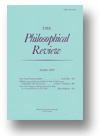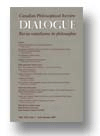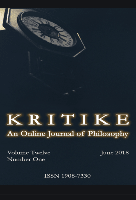
Epekeina-International Journal of Ontology History and Critics
Scope & Guideline
Navigating the Intricacies of Ontology and Critique
Introduction
Aims and Scopes
- Ontology and Historical Philosophy:
The journal delves into the historical development of ontological thought, examining key philosophical figures and texts from antiquity to modernity. This includes critical analyses of the works of philosophers such as Nietzsche, Aristotle, and Descartes. - Philosophy of Technology:
A significant focus is placed on the relationship between philosophy and technology, particularly in light of advancements in artificial intelligence and computational creativity. The journal investigates how these technologies affect notions of creativity, authorship, and human intelligence. - Metaphor and Language Theory:
There is a consistent exploration of language, metaphor, and their implications for philosophical discourse. This includes theoretical perspectives on how language shapes understanding and communication in philosophical contexts. - Interdisciplinary Approaches:
The journal encourages interdisciplinary research that bridges philosophy with other fields such as literature, digital humanities, and cultural studies, reflecting on how these disciplines inform and challenge philosophical thought. - Critical Engagement with Contemporary Issues:
It emphasizes critical reflections on contemporary societal and ethical issues, including discussions on posthumanism, the role of religion and capitalism, and the implications of modernity and anti-modernity.
Trending and Emerging
- AI and Creativity:
A notable trend is the exploration of artificial intelligence in the context of creativity, with several papers addressing the philosophical implications of AI-generated content and the distinction between human and machine creativity. - Posthumanism:
The theme of posthumanism is increasingly prominent, with discussions focusing on the implications of technology on human identity and subjectivity, reflecting a growing interest in how philosophical traditions can inform contemporary debates about humanity's future. - Digital Humanities:
The integration of digital technologies in philosophical discourse is emerging as a significant theme, particularly in terms of how digital interfaces can enhance the dissemination and engagement with philosophical ideas. - Ethics of Technology:
There is an increasing emphasis on the ethical implications of technological advancements, particularly concerning how they reshape concepts of agency, authorship, and moral responsibility in the digital age. - Interactivity and Narrative:
The exploration of interactive narratives, particularly in the context of video games and transmedia storytelling, is gaining traction, illustrating the journal's commitment to examining contemporary forms of storytelling through a philosophical lens.
Declining or Waning
- Classical Metaphysics:
There seems to be a reduced emphasis on traditional metaphysical discussions, particularly those that do not directly engage with contemporary issues or technological implications. This could indicate a shift towards more applied philosophical inquiries. - Historical Comparisons:
While historical figures are frequently discussed, the comparative analysis of historical philosophies appears to be less prevalent, as the journal increasingly prioritizes modern interpretations and applications over historical critiques. - Philosophical Aesthetics:
Themes related to aesthetics and beauty, which may have been more prominent in earlier discussions, are now less frequently addressed, possibly overshadowed by discussions on ethics and technology. - Existential Philosophy:
There is a noticeable decline in papers focused on existential themes, such as the nature of existence and individual experience, which may be giving way to more collective and societal philosophical inquiries.
Similar Journals

Convivium
Fostering Philosophical Dialogue Across BordersConvivium is a distinguished open-access journal published by the Universitat de Barcelona, Facultat Filologia, specializing in the field of philosophy. Since its inception, the journal has committed to fostering scholarly dialogue by providing a platform for innovative and critical research. Operating under an open-access model since 2007, Convivium ensures that its articles, which span a range of contemporary philosophical topics, are freely accessible to a global audience, thereby promoting the dissemination of knowledge. Despite facing challenges indicated by its current Scopus rank in the 2nd percentile of the Arts and Humanities, and its Q3 quartile in 2023, Convivium continues to thrive as an important resource for researchers, professionals, and students engaged in philosophical inquiry. With published volumes converging from 2009 to 2014, 2017 to 2018, and 2021 to 2023, the journal is poised to contribute significantly to the ongoing discussions and developments in philosophy.

PHILOSOPHICAL REVIEW
Elevating Scholarly ConversationsPHILOSOPHICAL REVIEW, published by DUKE UNIVERSITY PRESS, is a leading academic journal in the field of philosophy, recognized for its rigorous scholarship and impactful contributions to theoretical and applied philosophy. With an impressive Q1 ranking in the 2023 Scopus metrics, it places within the top percentile of philosophical journals, affirming its significance in the discourse. The journal, which has a rich publication history since its inception in 1970, focuses on a diverse range of philosophical topics, catering to a broad audience of researchers, practitioners, and scholars. Although it doesn't offer Open Access options, its articles remain highly sought after for their depth and quality. With a dedicated readership and a commitment to exploring fundamental philosophical questions, PHILOSOPHICAL REVIEW continues to shape contemporary philosophical thought and engage with pressing issues in various domains.

Topicos-Revista de Filosofia
Fostering Critical Thought and Global Philosophical DiscourseTopicos-Revista de Filosofia, published by UNIV PANAMERICANA, DEPT FILOSOFIA, stands as a significant academic platform within the field of philosophy, actively contributing to scholarly discourse since 2006 through its open access model. With an ISSN of 0188-6649 and an E-ISSN of 2007-8498, this journal is dedicated to fostering critical thought and philosophical inquiry in both regional and global contexts. Operating out of Mexico City, it provides a vital avenue for researchers, professionals, and students to engage with contemporary philosophical issues, reflected in its ranking of Q3 in the 2023 category for Philosophy and its position within the 33rd percentile among over 800 peer journals in the field according to Scopus. Topicos not only prioritizes accessibility to philosophical scholarship but also aims to propel academic discussions and elevate the standards of philosophical research. With coverage extending from 2013 to 2024, it invites contributions that bridge diverse philosophical traditions and innovative thought pathways, reinforcing its role as an influential resource for the philosophical community.

Phares-Revue Philosophique Etudiante de l Universite Laval
Illuminating the Path of Philosophical InquiryPhares-Revue Philosophique Etudiante de l'Université Laval, ISSN 1496-8533, is a prestigious academic journal published by the Faculty of Philosophy at Université Laval, situated in the heart of Quebec, Canada. This journal serves as a vital platform for emerging scholars in the field of philosophy, showcasing innovative ideas, research findings, and critical discourse. As a crucial resource for researchers, professionals, and students alike, *Phares* encourages the exploration of diverse philosophical topics, promoting intellectual engagement and rigor. Although it currently does not provide open access, the journal's commitment to fostering a rich academic community remains paramount. With its high academic standards, *Phares* stands out as a significant contributor to scholarly dialogue, inspiring ongoing inquiry and discourse within the philosophical realm.

Open Insight
Advancing Philosophical Discourse for AllOpen Insight is a prominent academic journal dedicated to the field of philosophy, published by the esteemed CENTRO INVESTIGACION SOCIAL AVANZADA, DIV FILOSOFIA in Mexico. Since its inception in 2017, Open Insight has been a vital platform for the dissemination of innovative philosophical discourse, bridging the gap between theoretical exploration and practical application in contemporary thought. With an ISSN of 2007-2406 and an E-ISSN of 2395-8936, this journal embraces a rigorous peer-review process and is committed to open access principles, ensuring the widest possible reach and impact of published research. Although currently positioned in the Q4 category and ranked 615 out of 806 in the Scopus Arts and Humanities (Philosophy) category, the journal actively encourages submissions that challenge conventional boundaries and inspire new avenues of inquiry. Researchers, educators, and students are invited to contribute their work, investigate philosophical dilemmas, and engage in meaningful discussions that resonate within the academic community and beyond.

Filozofia Nauki
Empowering Scholars Through Open Access KnowledgeFilozofia Nauki is a distinguished academic journal published by the Institute of Philosophy at Warsaw University, Poland, with a dedicated focus on the interdisciplinary realms of Philosophy and the History and Philosophy of Science. Since its transition to Open Access in 2020, the journal has broadened its reach, allowing scholars worldwide to engage with its content without barriers. The journal boasts an important standing in the academic community, currently ranked Q2 in Philosophy and Q3 in History and Philosophy of Science as of 2023, reflecting its impact and relevance. With an H-Index indicating its citation influence, the journal aims to foster critical discourse, sharing innovative research and ideas that push the boundaries of knowledge in these fields. Its Scopus rankings, with a percentile of 58th in Philosophy and 41st in the History and Philosophy of Science, further highlight its growing prestige. As it continues to publish cutting-edge research, Filozofia Nauki stands as a vital resource for researchers, professionals, and students committed to exploring the philosophical dimensions of scientific inquiry, ensuring a robust forum for discussion and discovery.

Plato Journal
Exploring the Depths of Thought and ExistencePlato Journal, published by COIMBRA UNIV PRESS, serves as a significant platform for the dissemination of research in the field of philosophy. Since its establishment as an Open Access journal in 2013, it has actively contributed to the accessibility of philosophical discourse, allowing researchers, professionals, and students from around the globe to engage with contemporary philosophical debates. Operating from Coimbra, Portugal, the journal is now classified in the Q3 quartile in the field of philosophy, and ranks 463rd out of 806 in Scopus's Arts and Humanities category, reflecting its growing academic influence. With a focus on promoting high-quality research, the Plato Journal encourages submissions that explore diverse philosophical themes, aiming to spark dialogue and foster intellectual connections. As it converges its powerful array of contributions from 2019 to 2023, this journal continues to embody the spirit of philosophical inquiry essential for scholars striving to understand the complexities of thought and existence.

DIALOGUE-CANADIAN PHILOSOPHICAL REVIEW
Shaping Contemporary Thought Through DialogueDIALOGUE-CANADIAN PHILOSOPHICAL REVIEW, published by Cambridge University Press, stands as an esteemed platform in the field of philosophy, with a notable impact factor that reflects its scholarly contributions. Established in 1962 and extending its reach into 2024, this journal is indexed under ISSN 0012-2173 and E-ISSN 1759-0949. As part of its commitment to advancing philosophical discourse, DIALOGUE is ranked in the Q2 category for Philosophy in 2023, placing it among the top-tier journals in the discipline. Its Scopus ranking of #338 out of 806 highlights its critical role in shaping contemporary philosophical thought. The journal encourages robust discussions and critical analyses across various philosophical domains, appealing to researchers, professionals, and students alike. Although it does not offer open access, DIALOGUE enriches the academic community by providing valuable insights and fostering dialogue among philosophical scholars in the United Kingdom and beyond.

Kalagatos-Revista de Filosofia
Cultivating a Global Community of Philosophical ThinkersKalagatos-Revista de Filosofia is a distinguished academic journal published by UNIV ESTADUAL CEARA-UECE, focusing on a broad spectrum of philosophical inquiries and scholarly discussions. With an ISSN of 1808-107X and an E-ISSN of 1984-9206, this Open Access journal has been dedicated to disseminating high-quality research and fostering critical thought in the field of philosophy since its inception in 2004. Positioned as a vital resource for researchers, professionals, and students alike, Kalagatos encourages dialogues that traverse traditional boundaries in philosophical discourse. With its commitment to accessibility and quality, the journal plays a pivotal role in contributing to the philosophical landscape, making knowledge available to a global audience. The journal seeks to publish original research articles, reviews, and essays that address contemporary and historical philosophical challenges, nurturing a vibrant academic community engaged in meaningful exploration and reflection.

Kritike-An Online Journal of Philosophy
Innovating Philosophical Discourse Since 2007Kritike-An Online Journal of Philosophy is a prominent open-access publication dedicated to the exploration and advancement of philosophical discourse. Published by University Santo Tomas, Faculty of Arts & Letters in the Philippines, this journal has been a valuable resource for philosophical scholarship since its inception in 2007, fostering accessibility and intellectual exchange across the globe. With an impact factor that reflects its growing reputation, and classified in the Q2 category of Philosophy as of 2023, Kritike serves as a platform for both established and emerging scholars. The journal’s ranking in the Scopus database, where it holds the 663rd position out of 806 in the Arts and Humanities – Philosophy category, underlines its commitment to contributing meaningful insights within the field. Ensuring open access since 2007 enhances its reach, making critical philosophical works readily available to researchers, professionals, and students alike. As the journal converges into a new era from 2018 to 2024, it continues to uphold its mission of facilitating rigorous scholarly dialogue and enriching the philosophical landscape.